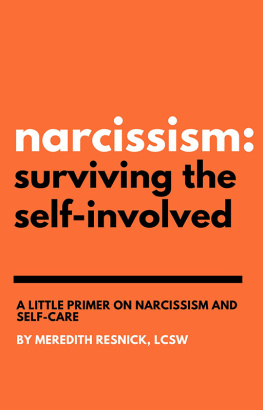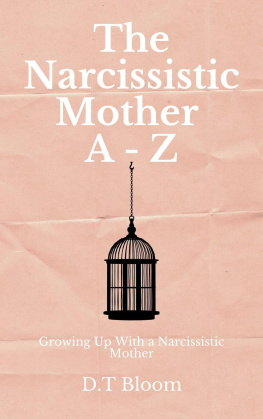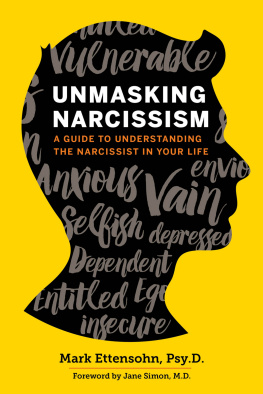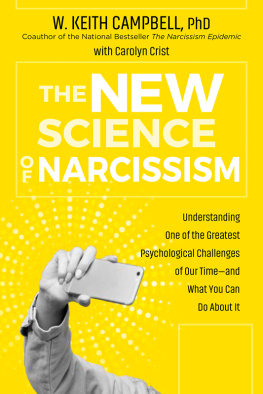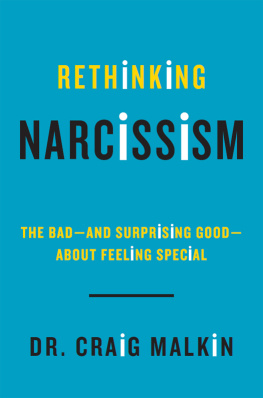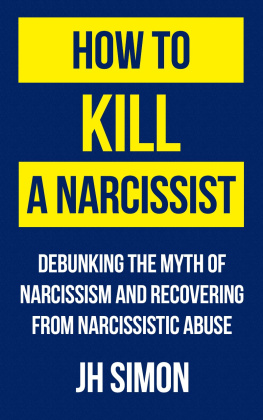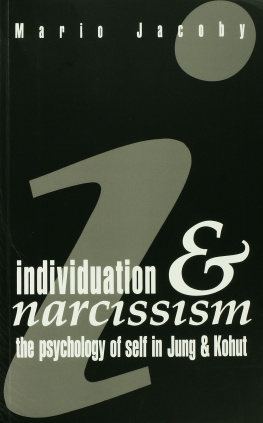WHEN NARCISSISM
COMES TO CHURCH
HEALING YOUR COMMUNITY FROM
EMOTIONAL AND SPIRITUAL ABUSE
CHUCK DEGROAT
FOREWORD BY RICHARD J. MOUW

The pleasure that is in his heart when he does difficult things and succeeds in doing them well, tells him secretly: I am a saint. At the same time, others seem to recognize him as different from themselves. They admire him, or perhaps avoid hima sweet homage of sinners! The pleasure burns into a devouring fire. The warmth of that fire feels very much like the love of God. It is fed by the same virtues that nourished the flame of charity. He burns with self-admiration and thinks: It is the fire of the love of God. He thinks his own pride is the Holy Ghost. The sweet warmth of pleasure becomes the criterion of all his works. The relish he savors in acts that make him admirable in his own eyes, drives him to fast, or to pray, or to hide in solitude, or to write many books, or to build churches and hospitals, or to start a thousand organizations. And when he gets what he wants he thinks his sense of satisfaction is the unction of the Holy Spirit. And the secret voice of pleasure sings in his heart: Now sum sicut caeteri homines (I am not like other men). Once he has started on this path there is no limit to the evil his self-satisfaction may drive him to do in the name of God and of His love, and for His glory. He is so pleased with himself that he can no longer tolerate the advice of anotheror the commands of a superior. When someone opposes his desires he folds his hands humbly and seems to accept it for the time being, but in his heart he is saying: I am persecuted by worldly men. They are incapable of understanding one who is led by the Spirit of God. With the saints it has always been so. Having become a martyr he is ten times as stubborn as before. It is a terrible thing when such a one gets the idea he is a prophet or a messenger of God or a man with a mission to reform the world.... He is capable of destroying religion and making the name of God odious to men.
THOMAS MERTON, NEW SEEDS OF CONTEMPLATION
Contents
Foreword
Richard J. Mouw
C huck DeGroat and I have been together on several occasions, and we have also corresponded about matters of mutual interest, but I cant say that we know each other well. While reading this marvelously insightful book, however, I had the sense that I was having a conversation with a close friend about worship services and meetingsand more than one private encounter with married couples!where he and I had both been present. That he assigns fictional names to the persons in the case studies he narrates even tempted me at several points to give real names to the folks in his stories.
My frequent aha experiences in reading what he has written signals that he is discussing issues that are all too familiar to those of us who pay even minimal attention to what is going on these days in the Christian community and the larger culture. As I was reading this book, I was struck by how often news reports and casual conversations include the word narcissistic. This is a book that speaks to matters that are the stuff of our daily lives.
To be sure, Chuck does more here than simply remind us of things that are familiar. For me, his insights come from a perspective that is well beyond my own area of expertise. I am in awe of how he combines pastoral experience with a grasp of psychological theory and therapeutic savvy. And he does thisand here I can claim some expertisewith solid theology.
There is much in these pages that inform us about different aspects and types of narcissistic personalities. What I find most helpful, though, is the way he probes beneath the surface of these categorizations. Early on, for example, he cites Christopher Laschs provocative observation that narcissism is the longing to be free from longing, a path that some individuals pursue to distance themselves from their humanity. This points us to the profound Augustinian insistence that we humans are created with restless spirits that can only find fulfillment in a healthy relationship with the living God. Narcissism, as is clear throughout these pages, is one means that individuals employ to alienate themselves from their true humanness.
There is some tough material in this book. Chuck rightly complains that narcissism among pastoral leaders is an understudied reality, and he charts out corrective measures by alerting us to warning signs. With the toughness, though, also comes hope, as he provides concrete evidence that narcissists themselves can find paths toward wholeness. But the hope offered here is not only for the hardcore narcissist. Chuck rightly urges all of us to engage in the difficult shadow work that requires directly confronting the darker sides of our individual psyches. When we do, he promises, we can discover in the darkness some of the holy longings that God has implanted in us for the journey toward finding our true humanity.
Introduction
N arcissist. Its a word we toss around today, perhaps too lightly, about politicians and pastors, celebrities and sports personalities. I do it. You do it. Perhaps there is some power in being able to diagnose, to label what both mystifies and terrifies.
This became a kind of sport during the 2016 election cycle, when Donald J. Trump found himself in the crosshairs of both amateur and professional diagnosticians. Among many others, John Gartner, a Johns Hopkins University Medical School psychologist, made the controversial contention that the leader of the free world is a malignant narcissist, demonstrating features of aggressiveness, paranoia, grandiosity, manipulation, entitlement, projection, and more. Its not my task to diagnose the leader of the free world. But its true enoughnarcissism in the public sphere can be dramatic and grand, a spectacle to behold, and even traumatic to experience.
When we experience narcissism personally and relationally, the toxic effects are painful and crazy-making. Perhaps hes the church planter whose charm and sense of authority appears compelling but whose leadership style produces a relational debris field. Or the spouse whose controlling behavior makes you feel unsafe and crazy. Or the committee chairwoman whose team walks on eggshells. When narcissism invades the space of family, work, or church life, the impact is dramatic and traumatic. Thats why I think a book like this is important. We need to talk.
But its not enough to look at narcissism through the lens of an egotistical political figure or an emotionally abusive spouse, an arrogant CEO, or a powerful religious figure. We swim in the cultural waters of narcissism, and churches are not immune. Western culture is a narcissistic culture, as Christopher Lasch declared decades ago in his famous book The Culture of Narcissism. The same vacuousness we see beneath an individuals narcissistic grandiosity can be found at a collective level in American culture, evidenced most recently in the #MeToo and #ChurchToo movements. While we tell ourselves stories of American exceptionalism, we hide whats beneathfragmentation, systemic racism, ethnocentrism, misogyny, addiction, shame, and so much more. Weve got a problemall of us. Its an us problem, not a them problem. My hope is that this book will invite each of us to ask how we participate in narcissistic systems while providing clear resources for those traumatized by narcissistic relationships, particularly in the church.


